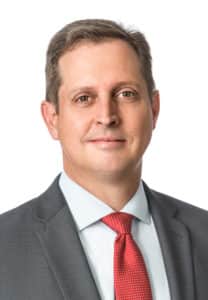For those living with chronic skin conditions like acne, rosacea, and psoriasis, the problem can be hard to hide. Bumps, redness, and inflammation can appear right on one’s face. Quintin Cassady understood the impacts of skin conditions like these at a young age. Cassady’s father worked in the heavy equipment industry in Oklahoma, and he and his colleagues developed red, ruddy skin from the years they spent outside. “My dad and most of his peers were constantly going in for things like cryosurgery because they had so many skin discolorations,” he says.
Cassady began working in healthcare law in the field’s early days. One of his clients was Galderma Laboratories, a pharmaceutical skin care company that develops topical prescription and over-the-counter treatments for acne, rosacea, psoriasis, and other skin conditions. In 2000, Cassady became Galderma’s vice president and general counsel for North America. Now, he is changing the narrative around skin conditions and increasing access to care.
Shifting political pressures and a lack of resources have led insurance payers to seek opportunities to cut costs. Topical skin treatments for non-life-threatening conditions are an easy target. “Government payers as well as managed care and insurance companies increasingly don’t see those conditions as conditions that warrant reimbursement,” Cassady says. “They see them as more cosmetic.”
In response, Galderma is changing the story regarding what types of care are deemed necessary. “As we start to face issues for coverage, we’re starting to have to better justify the value that our drugs add beyond just curing your acne or minimizing your rosacea,” Cassady says.

Acne, rosacea, and psoriasis can be debilitating conditions, and breakouts can have widespread repercussions. “Certainly for teens, acne is a really significant psychological issue,” Cassady says. “People that have acne breakouts are far less confident at school, work, and in social settings.” Rosacea typically affects older populations, but the effects are no less devastating. According to surveys conducted by the National Rosacea Society, 90 percent of respondents said their condition had lowered their self-confidence, 88 percent said their condition negatively affected their professional interactions, and 51 percent said they had missed work due to their condition.
Cassady emphasizes the socioeconomic implications of these findings. When skin conditions cause those affected to stay home rather than participate in work or school, it diminishes opportunities for advancement. On a case-by-case basis, this might not seem significant, but the US Government estimates that rosacea alone impacts more than 14 million people.
The narrative around rosacea, a chronic condition that is characterized by red, ruddy skin on the face and neck, has changed since Galderma patented its first rosacea treatment, Metrogel .75%, in 1988. At the time, rosacea was considered an orphan condition, and it was thought that fewer than two hundred thousand Americans lived with the disease. According to a study at the Wake Forest School of Medicine, an estimated 82 percent of those who live with rosacea still do not receive treatment.
Increasing awareness of the prevalence and impact of skin conditions such as rosacea, and of the treatments available, increases the likelihood that the right medications will reach patients in need. While Galderma is a well-known brand name among dermatological professionals and family practitioners—especially pediatricians who see many acne patients—it is not widely recognized by consumers, Cassady says. Galderma is owned by Nestlé, and in 2014, the company rebranded itself as Nestlé Skin Health. By capitalizing on the popular Nestlé brand, Galderma hopes to increase its profile and reach more potential customers who are living with untreated skin conditions. “We’re trying to use that as a vehicle to better tell our story,” Cassady explains.
“Real people are benefiting by what we do here. I see that on a regular basis.”
Galderma develops prescription, self-medication, and aesthetic and corrective skin-care solutions. Businesses can become isolated within a company with such wide-reaching interests. Throughout Cassady’s eighteen years with Galderma, his role has shifted from technical specialist to strategic leader. He was general counsel when Galderma acquired, licensed, or developed the businesses he interacts with, which gives him a holistic picture of the company that he uses to connect business leaders who would otherwise operate in parallel. “I know what’s been tried unsuccessfully, so I can help guide some of the strategy around our business philosophies,” Cassady says. “I have the ability, knowing enough about each of those businesses and how they’ve grown over time, to help them help the payers figure out how best to get our products reimbursed.”
Since Cassady joined Galderma, the legal department has grown from one lawyer and a small support staff to multinational teams with specialists in each area. Where Cassady might have once been closely involved in third-party contracts, he now leverages his relationship with third-party operators to strategically address broader-scale legal issues. “It’s a different skill set that develops over time,” he says. “It’s far less tactical and far more strategic today than it was when I started here.”
Skin care doesn’t end with prescription treatments, and the company’s holistic approach to treatment is an integral part of the story it tells payers. Products from Galderma’s diverse portfolio are often most effective when used in conjunction, an advantage it has over competitors who operate in a single market, such as prescription solutions. “You might get good reimbursement on a topical product, but a lot of those products have recommended that you also use a topical moisturizer in association with that,” Cassady explains.
Patients living with chronic skin conditions are at the heart of Cassady’s work. “Real people are benefiting by what we do here. I see that on a regular basis,” he says. “I’m excited about knowing that in some way I’m helping out those people out there that have ruddy skin that are working on the highway that I drive by.” This was, after all, why he started in the business to begin with.


